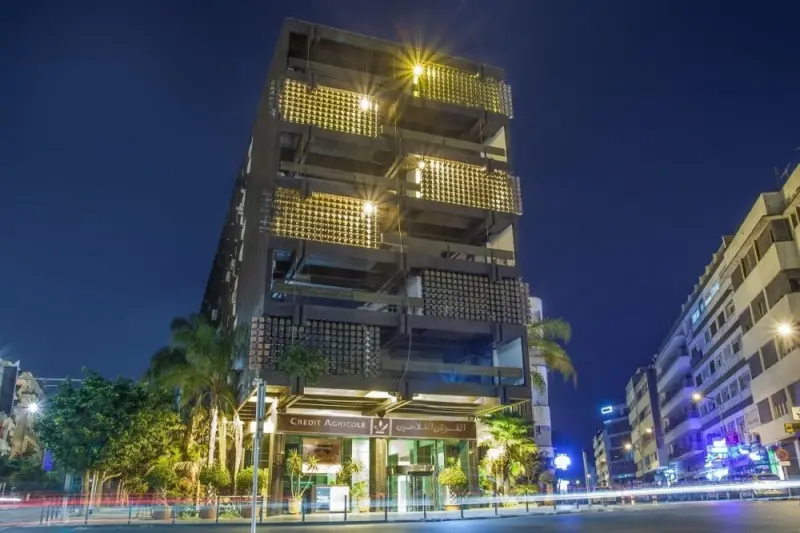- Experts have thoroughly analyzed the impacts of climate change on Moroccan agriculture, highlighting the crucial importance of the financial sector in contributing to the mitigation of these risks.
- The meeting brought together representatives from decision-makers and economic operators to align their efforts towards the transition to a green and low-carbon economy, demonstrating a strong commitment to sustainable solutions.
The Crédit Agricole of Morocco (CAM) and the European Investment Bank (EIB) organized a meeting today in Rabat aimed at raising awareness of climate change issues and promoting sustainable solutions for the Moroccan economy. Experts, decision-makers, and financial sector stakeholders participated in this day rich in debates and constructive exchanges.
In Morocco, the effects of climate change are widely recognized. Recurring droughts, floods, rising temperatures, and variability in precipitation significantly impact the economy, particularly the agricultural sector.
To face these challenges, Morocco’s sectoral public policies have integrated climate change adaptation, with a particular emphasis on water management. Furthermore, the transition to a low-carbon economy has become a priority, aiming to reduce dependence on fossil fuels and promote renewable energies.
The impacts of climate change also affect the banking sector by increasing the risk of borrower defaults. Therefore, effective management of climate risk and the implementation of climate resilience strategies are essential to mitigate these impacts and support investment in a sustainable economy.
In this context, the event concludes a technical assistance project from the EIB in favor of CAM, a project that has allowed for a better understanding of climate risks within the green bank and to continue identifying opportunities for sustainable finance.
During his opening remarks, Mohammed Fikrat, Chairman of the Executive Board of CAM, recalled the bank’s historical commitment to sustainable development and its role in supporting the green transition, particularly in the agricultural sector. For her part, Matilde Ceravolo, Head of the Economy-Environment Section at the EU Delegation to Morocco, shared the EU’s experience in the field of climate change, and Adrien De Bassompierre, head of the EIB representation in Morocco, presented the EIB’s climate strategy.
Subsequently, Kenza Khomsi, Climate Manager at the General Directorate of Meteorology, addressed the trends and future projections of climate change in Morocco and their impacts on the Moroccan economy. Riad Balaghi, an agronomy researcher, analyzed the impact of climate on Moroccan agriculture.
The discussion panel provided a platform to stimulate dialogue and share the views of various stakeholders on the challenges of adapting to climate change and the role of the financial sector in this context. It brought together recognized experts: Faouzi Bekkaoui, Director of INRA, Assia Benhida, President of the Sustainable Development Commission of CGEM, Youssef Farhat, Deputy Director of the Budget Directorate, Godefroy Grosjean, Senior Manager, CGIAR Hub for Sustainable Finance, and Brahim Laroui, President of the Oilseed Processing Industrial Group.
Exchanges between economic operators, farmers, researchers, and government departments thus allowed for discussions on expectations regarding financing the transition to a green and low-carbon economy and strengthening the resilience of financing tools against climate risks.
“We are pleased with the quality of the partnership with the European Investment Bank,” said Mohammed Fikrat, Chairman of the Executive Board of CAM. He added: “The project will allow us to strengthen our internal processes for managing climate risk and consolidate our green transition financing offers to better support our clients in facing the major challenge posed by climate change for our country.”
“The harmful effects of climate change are already very palpable in Morocco, particularly in terms of precipitation levels and frequencies and the resulting chronic drought. In this context, our collaboration with Crédit Agricole of Morocco is particularly relevant and illustrates our shared commitment to better assess climate risks,” said Adrien de Bassompierre, EIB Representative in Morocco. “As the European Union’s bank and the climate bank, the EIB is determined to support financial institutions and, through them, SMEs to better understand these risks and find innovative and sustainable solutions, to turn challenges into opportunities and thus strengthen the resilience of the Moroccan economy.”


